#or that things will focus on the main protagonists
Note
HELLO I WOULD LIKE TO HEAR ABT UR NINJAGO OPINIONS PLS
seriously tho I love this show so much and I'm always looking for excuses to talk to people about it so... thoughts on where things might go after S2Pt2? I'm starting to believe the evil Arin theories, but I feel like our boy deserves more nuance than that...
I'll gladly indulge! you can always bother me with ninjago thoughts in either my inbox or dms :3
I don't personally think the evil arin theories will come to fruition, but I do think this will blow up in the team's face if they can't properly address arin's self-worth issues soon (they won't). especially since it was confirmed that he doesn't have any elemental power. everything is so tense on the team after kai getting yoinked into the nether space, and it's only gonna get worse when they see a lightning EM in the s2pt2 tournament. and when arin finds out that sora helped him with his object spinjitsu, ohhhhh he's not gonna be happy. I can maybe see him leaving the team for an episode or two, but I don't think he'll go awol. the show is definitely trying to insinuate that though huh :')
lloyd and sora just need to stop coddling him for a second. they're forcing optimism on him when what he needs is a heart to heart about his actual capabilites. the boy is very capable, but he needs to be able to say "I can't do it" and actually have someone respect that and say "okay, here's an alternative instead."
but that's s2pt2 commentary. you asked what I think will happen in s3 and beyond
I honestly think they're gonna focus more on jay in s3. I think we'll see him a fair bit more throughout s2pt2, but I don't think the main cast is gonna realize it's him until towards the very end. and I honestly can see the season ending with the team realizing jay's alive, and the production crew won't actually try to "deal with" his arc until s3. and as much as I love jay, I hope they draw out his arc and make everyone suffer :) I do really want him to get his memories back in the end tho
I also wonder if we'll get a glimpse at next season's protagonists? similar to how ras was carried over from last season into this one, could the forbidden five somehow carry over into s3? idk. I'm just thinking out loud. I don't really believe that'll happen. tho I think it would be strange to give them so much lore without giving them more significance and screentime
anyhow, that's all I have for now. I'd be interested in hearing some of your other thoughts for what the future seasons hold.
#sorry I waited a bit to respond. I'm bad at time management;;#ninjago dragons rising#ninjago#dragons rising#answered
23 notes
·
View notes
Text
Wait a damn minute…
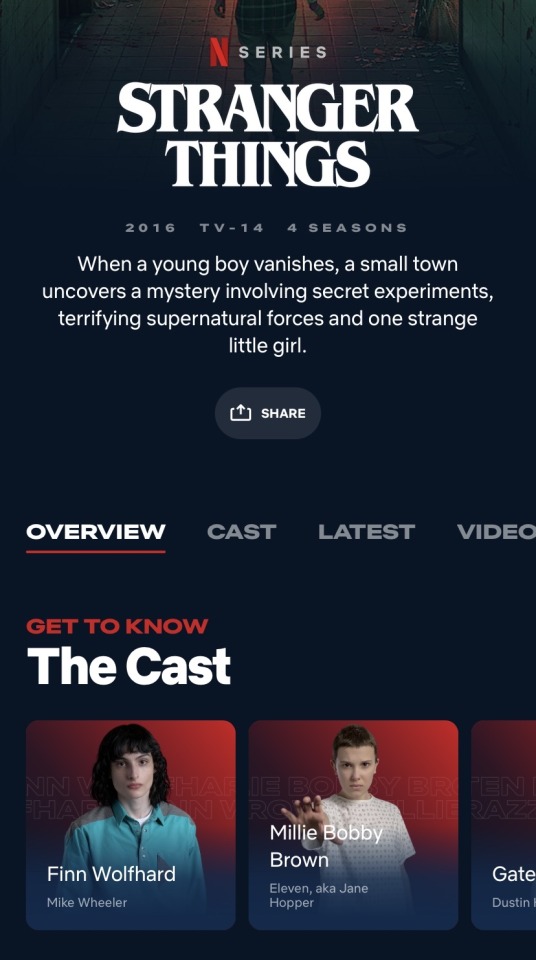
They’ve got Finn (Mike) listed first before everyone else in the cast on the Tudum site aka the most official, up to date site for the show besides Netflix.com?…
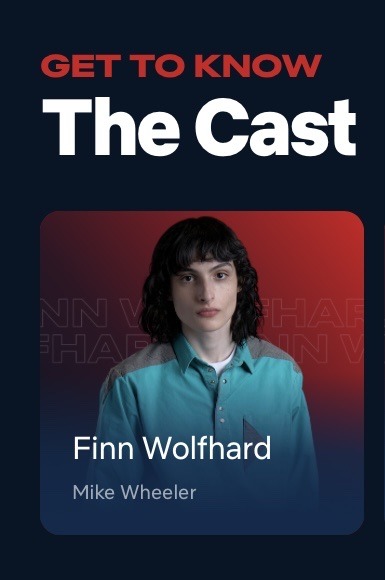
This got me thinking… I wonder if they—
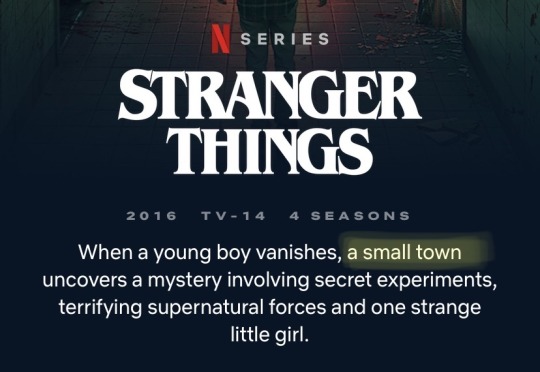
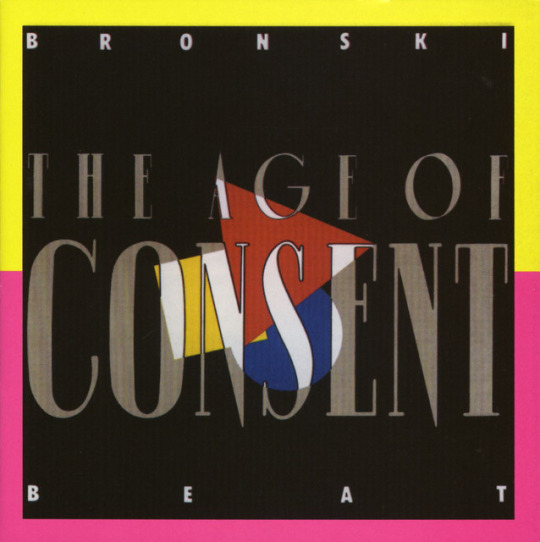
!! MIKE MAIN CHARACTER ERA IS MAKING A COMEBACK IN THE FINAL SEASON OF STRANGER THINGS !! MARK YOUR CALENDARS 2024 !!
#stranger things#mike wheeler#byler#I don’t think they intentionally did this in terms of it being a literal smalltown boy reference#however if the duffers were to broadly explain the synopsis of the show…would they use the word smalltown?…#my main shock is Finn (mike) being listed first…#not only before Millie who follows right behind him#but also the older cast whose getting pushed to the end#which is a result of them choosing to put mike first out of all of them#you know what that means?#we’re going full circle#we’re going back to s1-2 roots#there’s literally nothing else they could mean by saying that#and it’s because the main difference between s1-2 and s3-4 is Mike used to arguably be the protagonist#and so… yeah that’s clearly what they’re referring to in terms of vibe#we’ll still get other povs and focuses just like we did back then#and there will be scenes with Will being the focus and el being in the focus for their arcs storylines#but Mike arguably is going to have to circle back and return to us as his own character as well#the ga is gonna realize they missed him dearly I can’t wait
163 notes
·
View notes
Text
something else i looove about kakegurui is how yumeko is so hard to understand and she seems enigmatic and like, to a degree almost lacking character. she seems like that to the reader and to everyone else. but once you're several arcs in the little hints and singular moments of previous arcs start to come together and a lot more about her is apparent, you start to understand her. well enough, even, to understand how many of the characters looking at her, thinking they understand, are wrong about her.
and all of this has improved further with the recent flashbacks, and im assuming this revealing of yumeko will only continue, and its great. i love the slowness of letting us into knowing her--that nothing has been in her pov. it's great.
#shitpost#a lot of people hate kakegurui because they read yumeko as crazy/simplistic/shallowly written#but thats the THING. we aren't invited into her. which is a WEIRD choice for the seeming 'protagonist' of the story#because she's not really written like a protagonist#the people AROUND her are. we get their points of views and such#but yumeko herself remains a mystery which is not common for the main character. the focus character. etc#anyways /i/ love it. and if you read/watch kakegurui and slowly think about who yumeko is... you are in for a treat#and i just can't wait for even more to be revealed.
3 notes
·
View notes
Text
Back on my bullshit abt marcia and protagonist syndrome. Marcia has protagonist plot armour combined with the curse of being the protagonists mentor so she's constantly just barely surviving situations
#sep talks#septimus heap#marcia overstrand#going by trope rules marcia should be dead but instead shes just gone through like 50 different near death experiences#marcia's so funny she could be so many things so easily but she just isn't#like villain marcia wouldn't take changing much. Protagonist marcia. Dead mentor/parent figure trope marcia#you could change like 1 thing and it would fit#(protagonist marcia specifically all you'd have to do would be. Make her the protagonist. Like obviously but it's more like#with beetle or the heap brothers or whoever they r all definitely side characters and so is marcia during when the series takes place#but if u just. Shift the series back like 10-20 years? You have to change basically nothing about her life for her to be a good#main character. Which is so funny)#I love her btw if u couldn't tell#EDIT u probably wouldn't even have to shift the series back a few years bc the amount of stuff that happens to marcia in the series itself#is insane. The issue is that most of it is just the side effects of being around septimus#but then again!!!!#magyk could definitely be made marcia-centric. Flyte too if u focus more on the Shadow (tbh idk what happens in flyte)#physik actually is about septimus specifically so that's whatever#queste+syren also#darke and fyre are another 2 that could definitely focus more on marcia if u wanted them ti#fyre especially#I'm rambling and mostly talking nonsense so ignore this idk but abdjdbdhdnbd
23 notes
·
View notes
Note
In the newest interview, alvaro said that big chances that professor wouldn't be in the spin off because it's berlin's project and focusing on his new cast or crew. He said this one (Berlin) is separated from LCDP. Does that mean that we wont get Palermo too? 😢 I mean, if the whole 8 eps are just about berlin having fun with strangers he pretends to be friends with, whats the point of watching? The only thing we can hope, maybe the plot would be good, but from the teaser, I too have a doubt about it.
I haven't seen that interview (if those are his exact words, "big chance" is a weird way to phrase it since shooting is done, he's either in it or he's not lol.) Anyway, I wouldn’t take too much away from his words. They are pretty much a rephrasing of what Pina has been saying. They might mean Sergio won't show up at all, or that Sergio will only show up through a cameo, not in as a central way as LCDP. And that makes sense to me either way. I would personally love a cameo but generally regarding Sergio, it makes sense that he wouldn't be present through all his brother's heists and gangs and day to day life (which was already established in canon).
So I wouldn't compare Sergio's situation with Martín. At least on a textual level. Once established that Andrés had met Martín, it would make zero sense that Martín wouldn't be there since we know from canon Martín has been on his side for ten years prior to the monastery flashbacks. And generally speaking, there is not a single character from LCDP that belongs more in Berlin the show than actual lcdp lmfao. Martín's entire construction in canon was in the framework of Berlin.
That's not to say the show won't be about Berlin having fun with strangers for 8 episodes lmfao. That will probably be it. But I'm still in the belief that Palermo will guest-star or cameo in the last episode, as a form of Berlermo's first meeting. And I think if Rodrigo agrees and Netflix grants Pina a second season, he might be a main character going forward. I don't think there is a lot to hope for from the spin-off but I still believe it will be better and more surprising than we imagine now.
#regarding the whole Berlin is different from lcdp thing. it's just so stupid to me#i get that a spin-off should stand on its own legs. all spin-off creators want this to happen. a certain distant from the OG#but when it goes too far it becomes ridiculousl#Pina seems to believe he created a character that's so marvelous that you can generate an endless number of seperate stories from it#but in my view if you uproot a character soo far from his context (especially when it's a main character that you already milked in differe#t scenarios.) then you just lose focus and it ends up failing#ANYWAY I think there is a chance for Berlin to get a second season pretty quickly now whether it's wildly successful or not because of#the strikes#with the uncertainty of when American-produced shows will start production again; Netflix is basically reliant on European and other foreig#shows to keep their audience and subscribers appeased#and Berlin connected to lcdp (One of Netflix's biggest world-wide sensations) might get even more special treatment#lcdp#Berlin Netflix#also cursed idea but I think Pina might be on the road to make Berlin this sort of Pulp fiction adventure protagonist who is in a series of#2638833 books and each story with different cast of characters around him and different story but doesn’t seem to be getting older#or even aware or the things that happened to him in previous stories lol#I'd say the Sherlock Holmes character but in crime fiction but that's what Lupin is lol#it would be a poor imitation but I would find it hilarious if after all those connections Pina is trying to patch together between Andrés#and the new gang#next season he just changes them for a completely different cast and he keeps doing this for 37 more seasons#Netflix forgets he's on their payroll and it's 2035 and 60 smth Pedro is still playing 27 Andrés going on thievery adventures around Europe
2 notes
·
View notes
Text
i might think excluding adam from tdt is a bad writing choice and a disservice to readers actually. hes an already established character the audience loves. its one thing to have characters altogether absent from the narrative, like the indonesia trio, but adam is present and unimportant, and i dont think anyone can go from trc to tdt and feel satisfied by that
#especially because weve been given a snippet of his harvard life and its...bad#it would have been another thing if he was neutral about his new context - not much to say about that! lets focus on ronan#but the context is not neutral its bad. this character who again#we know and consider a protagonist and a staple of this fantasy setting#is living and navigating a complicated emotional situation where hes not really happy and has made decisions#that deserve way more attention than whats been given to them#yeah thats the main thing actually#adam parrish#trc#the dreamer trilogy#the declan cycle#.rtf
9 notes
·
View notes
Text
DPxDC and OOC
I've had a couple of posts cross my dash recently where people lament that a lot of the dpxdc fandom writes characters very OOC and how we're proliferating these characterizations among each other. I figured I'd add my own two cents.
I think the fundamental discrepancy comes from trying to reconcile two canons with vastly different tones.
Danny Phantom is a comedy superhero show operating on cartoon logic. Why do ghost experts Jack and Maddie never realize their own kid is a ghost? Why is the status quo restored at the end of every episode? Why does Danny shoot an ectoblast out of his butt that one time? Because it's funny. It's cartoony action fun where the plot is resolved in 22 minutes, there's never any lasting consequences and it's aimed at kids.
DC meanwhile wants to be taken Seriously. Heroes get beaten within an inch of their life, traumatized, killed and even the good guys do messed up things (often to each other). Yes there's action and puns, but also horrific violence, actions have consequences and it's (mostly) aimed at adults. When a main character dies the comics show their family and friends mourning and things are very dramatic. Even though at this point we, the audience can pretty much expect every death to be undone within 2-5 years of publishing, but I digress.
So how do we, the fanfic/fanart creators reconcile these differences when we make our crossovers? We either make DP more serious and somber, or we make DC more comedic.
Suddenly we have a DP verse where the Fentons' bumbling obliviousness is elevated to serious neglect or outright abuse. The GiW are no longer a minor annoyance, they are a serious threat with genocidal plans and a desire to vivisect the protagonist. When actions have consequences, we imagine Danny as dealing with serious PTSD from having to be a solo superhero and witnessing his family's death that one time (and maybe also getting vivisected). Danny is not just a teen superhero, he's now the Ghost King with serious responsibility on his shoulders.
On the flipside, if we make DC more comedic we tend to exaggerate character traits for comedic effect, focus more on the interpersonal dynamics (especially the Batfam) and have the characters act more casual and silly. Suddenly the Batfam goes from a group of seriously messed up individuals who have trouble communicating with each other and fight all the time to Batdad "Kids if you don't stop killing criminals you won't get dessert ffs" Bruce. Violence is played for laughs instead of taken seriously. Yeah they fight, but they still Love Each Other.
And THIS IS PERFECTLY FINE. It's transformative work! And trying to reconcile these disparate fandoms is hard! Fandom is a labor of love. We do it for free. We do it for our own entertainment. And no one is forcing you to read fics you don't like. DLDR and all that.
2K notes
·
View notes
Text

I guess the funny thing is, people used to simplify Adventure Time Plot into, like, ‘let’s save Princess Bubblegum from the Ice King!’ But that was really only the plot of the Pilot. I mean, Princess Bubblegum was established fairly early on as Ice King’s favorite kidnapping victim. But that with the Pilot kinda establishing it as the Default Adventure Time Premise.. that kinda established it as being too generic to spend a whole episode on that.
So we’ve had a few episodes where Princess Bubblegum needed to be saved

And a few episodes where they needed to save a Princess from Ice King
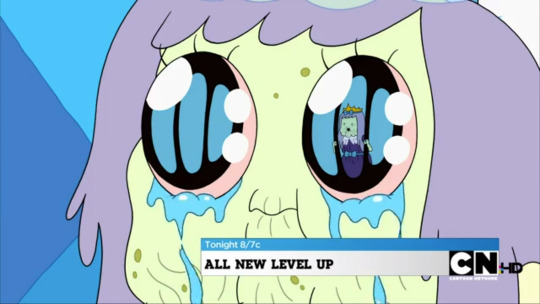
And usually ‘saving Princess Bubblegum from the Ice King’ has been used more like a minor plot point rather than the main focus of an episode
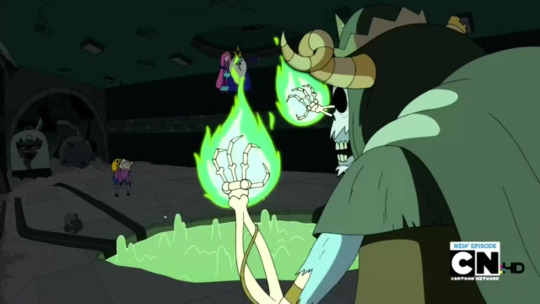
Or the subject of variations and parodies. I mean, we kinda got ‘saving Ice King from Princess Bubblegum’ before Season 1 ended!
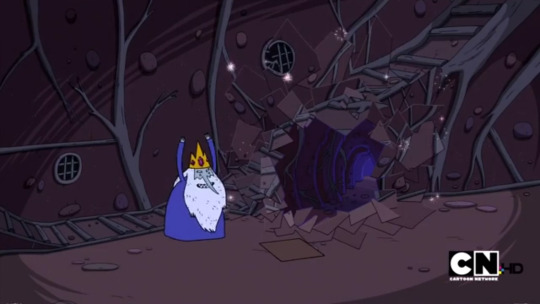
The only episodes that would kinda count for that is ‘Ricardio the Heart Guy’ (saving Princess Bubblegum from Ice King’s organ), ‘Wizard Battle’ (which was really more about Finn’s jealousy than actually saving PB), ‘Princess Monster Wife’ (Peebles was one of multiple princesses victimized by IK, and it’s not like she was saved by the Protagonists actions) and ‘A Glitch is a Glitch’ (non-canon, and PB really kinda took care of herself in that regard)
But then it turns out, “The Winter King”, despite originally playing itself up as a role-reversal

Was actually the most straightforward ‘Saving the Princess Bubblegum from the Ice King’ storyline since the Pilot.
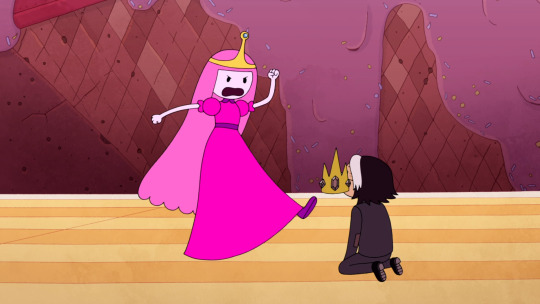
#adventure time#atimers#fionna and cake#fionna & cake#at#fac#f&c#adventure time fionna and cake#at fionna and cake#adventure time simon#fionna and cake simon#fionna and cake series#fionna and cake show#simon petrikov#ice king#the ice king#the winter king#winter king#candy queen#the candy queen#princess bubblegum#bonnibel bubblegum#adventure time bubblegum
1K notes
·
View notes
Text
Unfortunately I came across a very strange and misinformed video about Black Butler.

It’s not good. Don’t watch it. Unless you wanna ruin your day, in which case have fun.
Despite it all, I watched it. What left me wondering, however, was how off the mark the person who made the video was on, well, everything.
From their insistence that the Book of Circus Arc theme or point is non existent, to reading Ciel’s character so badly they genuinely thought the Green Witch Arc did nothing for his character development.
While baffled, it also made me think on how someone could read Black Butler so badly.
Sure, you can say that there’s no real way to read or interpret something “in the wrong way” but interpreting The Hunger Games as a pure battle-royale action story would make you believe it’s bad.
“Why are we focusing so much on how the capitol preps them?” Or “Why isn’t Katniss winning everything?” Or “I wanna know more about the rebellion” All questions that miss the actual point of the story - which is criticizing (not solving or ignoring) the way that media distracts us from violence via spectacle.
The same thing applies here. While there is no “right” way to consume media, there’s things that the author makes clear they wanna focus when creating a story. Things that, if you understand, make the story you’re reading actually make sense.
And in Black Butler there’s three things that you have to understand to properly get what Yana is saying.
Sebastian is the protagonist
Ciel and Sebastian’s relationship IS the story.
And that relationship is, fundamentally, a positive one.
A quicker version of it would be:
Black Butler is a love story from the POV of Sebastian, and you have to ship it to get it
- but that’s not entirely true.
You can still look at it as a complex but ultimately positive rship and get in broad strokes of what it’s conveying. It doesn’t have to be romantic. Although, it helps much more than a platonic framing.
(That said, interpreting their rship as father and son, still isn’t the best way to go about it. Mostly because by its very nature of “soul consuming” their relationship is extremely sexually charged. And hey, if you’re into that I don’t judge. However, if you’re desperately trying to interpret their rship as NOT romantic to the point you fall back on heteronormative patriarchal ideals of nuclear familiar as framing device, I don’t think this interpretation bodes with you)
Now, having all that ground work:
Why do I say these are the key components to understand BB?
Okay so, first,
1. Sebastian is the Main Character. The protagonist.
There’s a lot of people who wanna argue against it, claiming he’s either the villain or the antagonist. Both wrong.
He does not function as an antagonist. Even if, and an emphasis on if, you consider Ciel to the protagonist, Sebastian isn’t a narrative antagonist.
If you wanna go back to Creative Writing 101, be my guest. An antagonist is directly defined by the protagonist. It’s the opposing force. If the protagonist wants A, the antagonist wants to stop them from getting A.
Sebastian’s catchphrase is “Yes, my Lord”. He never opposes Ciel, in fact quite the contrary. By the mere fact they’ve created contract, it means that they’ve both agreed in the inevitable outcome.
People want to frame Sebastian as the villain, because Ciel having his soul taken by a demon, would be a BAD END in the context of their moral compass. They see Ciel as a frail victim of abuse, who’s being tricked by Sebastian, who wants Ciel’s soul.
Which is an. Interpretation. A bad one. But still one.
The narrative (and whether the narrative fits your personal moral compass and lack of critical thinking is irrelevant) treats Ciel as an agent in his own destiny. The abuse he suffered was the moment in which he had no control. It’s only after he meets Sebastian that he can rid of both his guilt and his despair, and do what he wants.
In this case though, it’s revenge.
The famous “Asthma” scene shows this. If Ciel is taken back to his past, he becomes helpless. Swarmed with pain and memories that make it so that he can’t even react. Sebastian is his saving grace. If Ciel didn’t have him, and the power he wields to rebuilt what’s broken, he would crumble once more.
If Ciel has a panic attack, because of all the pain he has, Sebastian picks him up and says “you are not a helpless child anymore, you are not a victim anymore, you have the power to do anything. So, what do you wanna do?”
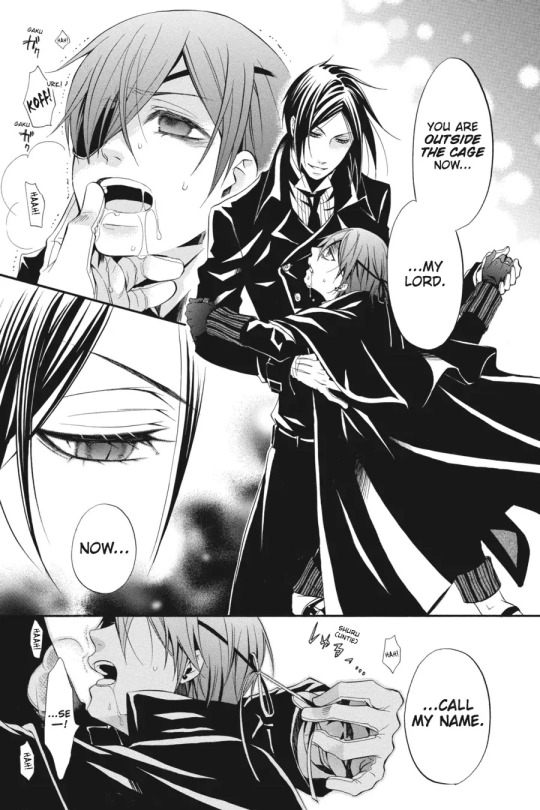
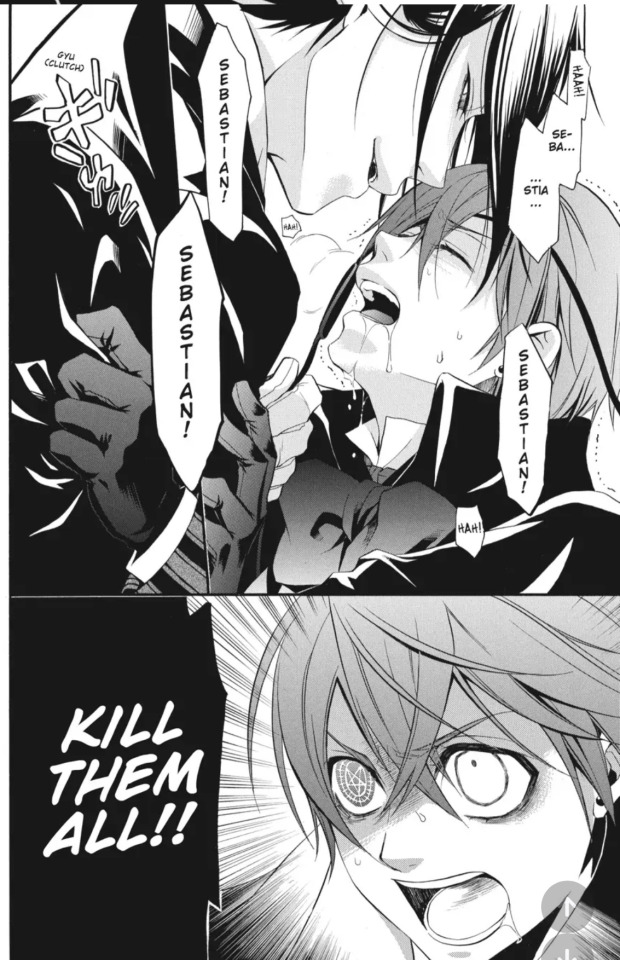
Ciel’s answer is to kill them.
A proper analogy would be to say that, if Sebastian offers a gun, Ciel pulls the trigger. They are both at fault. Sebastian, strictly speaking, is not here to directly cause Ciel’s downfall, but as a tool Ciel uses to plunge into the abyss.
If, again if, you were to frame Ciel as a protagonist, Sebastian falls closer to the “Voice of reason” character. Not a literal voice of reason, but a literary one. If you have a protagonist and an antagonist exchanging ideals, the Voice of Reason serves to engage with the protagonist on their own ideals.
That said, Ciel isn’t the protagonist. The story quickly falls apart if you interpret it as such.
Things such as Ciel’s character arc being…shall I say odd?
It’s not that his character arc isn’t there, but it’s never lineal. His goals stay the same, the only thing that happens is that we start to peel back the “why”s of his goals. Throughout the series it’s never about Ciel understanding himself better, he knows who he is, he knows what he wants, he knows why he wants it. He doesn’t ever need to uncover these, but simply remember them. Because it’s always about the audience understanding Ciel.
He knows he wants revenge.
In the Circus Arc: He knows that he needs Sebastian because without him, the pain of the abuse he suffered would be too much to bear. But WE are introduced to it.
In the Book of Atlantis: He knows that with this new lease he does not want happiness and peace, he wants revenge. The one being told this is the audience.
In Green Witch Arc: He knows that their revenge isn’t for his family, the real Ciel or guilt. It’s because he wants it. He’s angry, he’s upset, and this is entirely for him. The one being told this is the audience.
Except. Not really. The one either discovering or remembering these key moments - is always Sebastian.
Sebastian is the one who reassures him that he now holds the power of a demon to override the pain. Sebastian is the one who remembers that to override that pain, Ciel wants revenge. And Sebastian is the one who discovers that that revenge isn’t built out of grief or guilt, but for himself.
We are witnessing it all, through the eyes of Sebastian.
This is why we have an extremely vague idea of who Ciel is, Sebastian does not have the whole picture.
If you haven’t been reading this manga with your eyes closed, you’ll realize we have a better grasp at Sebastian’s character than that of Ciel. We get a lot of insight on how he thinks and what he values through light hearted dialogue he has with the servants. You even see the character development in these little interactions.
Think about how when he first arrived to the mansion he magically created food with no regards to taste, but when he meets Bard he states that food is created to see whoever will eat it, smile.
That is character development, more than you will be able to see from Ciel.
Because Ciel’s character, while not static, doesn’t go from point A to point B. Mostly, cause it doesn’t need to. He went through that when he lost the real Ciel and got Sebastian. Everything we are watching is the falling out.
Now, given the fact that I’ve told you that it makes more sense for Sebastian to be the protagonist/main character, and that he 100% isn’t either a villain or antagonist in ANY of the interpretations you can get:
Do you believe me?
If you don’t, you’ll probably believe Yana herself.
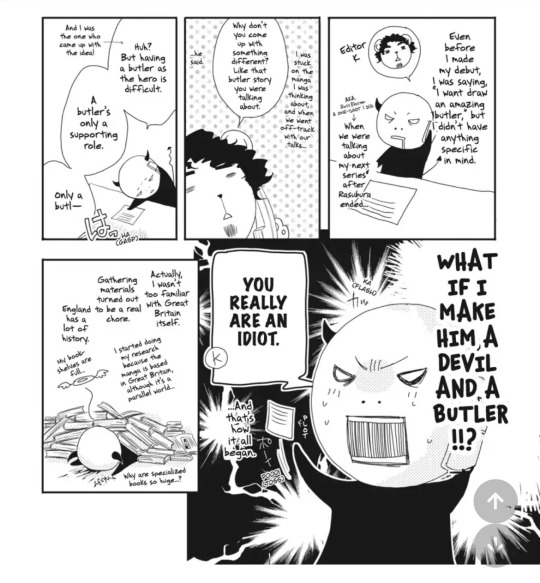
This is from the first Volume, where Yana herself describes the process of making Black Butler. The primary idea behind the creation of BB was a butler as a “hero”.
If you go back to the introductory chapter, you notice that Ciel is barely mentioned. He’s simply the one to give Sebastian impossible tasks and standards that Sebastian must find how to overcome.
Ciel is properly introduced until the NEXT chapter. The second chapter has this formula too, introducing Lizzie as a problem to overcome. Although, to Sebastian the best way to “get rid of the problem” is simply to indulge her.
The issue here being that the problem isn’t as simple as a business meeting but something directly tied to Ciel and Ciel’s past. Each time that Sebastian has to solve a problem, it chips away at Ciel. While with Lizzie he shows a persona, once he’s alone with Sebastian he acknowledges the toll it took on him. It serves to build Ciel as Sebastian’s master, and how some problems aren’t as simple as discarding a tablecloth.
The third and the fourth, are a unified narrative, with a similar premise to the first chapter. Ciel gets kidnapped and Sebastian must find a way to retrieve him without raising suspicions.
If the first chapter is to set up what Sebastian must do as a butler, the third and the fourth serve to set up what he must do as a demon.
The entirety of the volume, and up to Book of Circus Arc, is about how Sebastian tries to follow the increasingly absurd orders that Ciel has - it is not about Ciel trying to solve them.
That’s how they work, we follow Sebastian for the most part, because he’s the one having to come up with the solutions.
If anything, in early Kuro, where the emphasis was more on a slice of life conflict, Ciel is the antagonist. He’s the one creating problems for Sebastian to solve.
What’s more, in the second volume, the very first chapter is one from Sebastian’s POV. So far, we hadn’t gotten an entire chapter from Ciel’s POV. In fact, I would find it hard to point to a single chapter where Ciel is the POV throughout. The reveal of real Ciel and the flashback is the closest contender.
But once we move past early Kuro, and into Book of Circus, this set up changes.
It’s fairly easy to assume that Ciel is the main character, because from this point on the conflict of the plot sorta surrounded him. We spend a lot of time with him and with his story. The enemies start being people directly tied to Ciel and Ciel’s trauma. Rarely, if at all, we get to see Sebastian before he met Ciel.The framing device for the story, is Ciel.
This is where point 2 gets intertwined.
2.- Sebastian and Ciel’s relationship IS the story.
The story begins at the point where Sebastian and Ciel met. Who Ciel was before he met Sebastian, informs why he’s the way he is when he does. You have to know all he went through to understand why he’s a brat, why he lashes out. However Sebastian’s past doesn’t matter…because Sebastian himself doesn’t care much for who he was, before he was “Sebastian”. That’s also part of the narrative.
Unlike Ciel, he doesn’t seem opposed to revealing information from before the contract. He talks about how pets from where he is from are gross, he talks about how he knows how to dance because of other places he’s been to, and alludes to the life he's lived before.
Just that, to him, they're footnotes.
He makes allusions to a very bland, uninteresting life, up to the point he meets Ciel.
That’s why we don’t know more about his past.
As for why we focus on Ciel’s story…okay maybe we need Creative Writing lessons 102
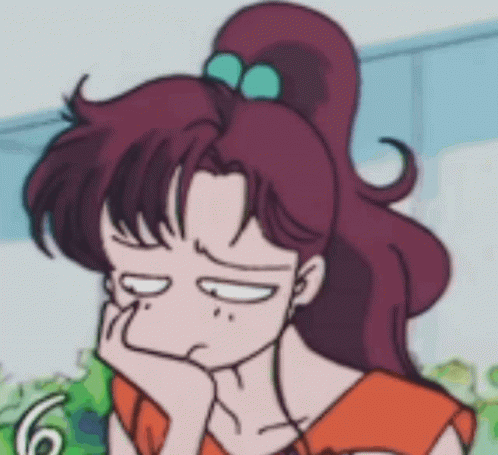
I studied Dramaturgy for about 3 to 4 years. And something you notice is how play-writing is the quintessential story telling. It’s making it work with the bare bones of a story.
Some other mediums have more finesse, more depth, or more spectacle - all amazing things that work for whatever they’re created for. But understanding a play, how and why it works, helps understand the fundamentals of any derivative story telling medium.
Particularly, conflict.
Conflict is dialogue and dialogue can take many forms. A story, in its essence, is a dialogue between two opposing ideas.
Take Batman, for example, who embodies the ideas of justice and order. On his own, he’s not a well rounded character.
If you ONLY present him, in a vaccum with nothing else, you don’t have a character. You have a list of characteristics that you’re supposed to know.
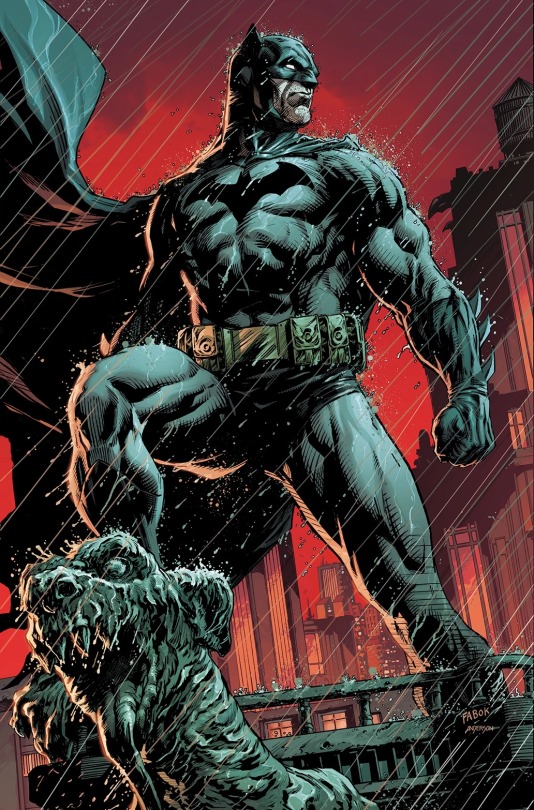
You only know who he is when you have dialogue with another character.
I say Dialogue, but it doesn’t necessarily mean spoken language at one another. Dialogue can mean fist fighting, playing tabletop games, talking to other people about the other, or even just a competition. The idea is to simply to compare and contrast both ideas.
If you want an example on how tabletop games serve as dialogue, watch the video “Well, Someone Had to Explain the Liar’s Dice Scene” by Lord Ravecraft
Another example, were we to retake Batman, you have him fight Joker. Who’s the embodiment of chaos and randomness.
In the following picture, you get far more information than the one previously shown. While the Joke fights with daggers and fake guns, Batman only uses his fists. He doesn’t use the tricks that Joker does. His serious demeanor, contrasted with Joker’s glee at the dangerous situation. The fact that Batman has a deathly grip on Joker’s shirt, while the Joker doesn’t, which shows a desperation to catch him.
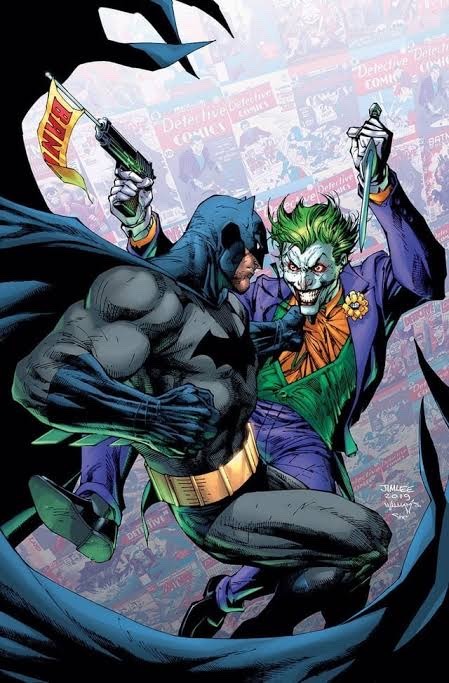
You are being shown, through a dialogue, who Batman is.
It’s so much easier and much more effective to explore a character through another character.
This is the reason why Shonen has a tendency to make incredibly good gay ships. If you want to explore Naruto’s personality, and his feelings of inferiority, you HAVE to have him interact with Sasuke.
If you wanna understand Hinata’s passion for volleyball, you have him enjoy himself the most with the only other crazy motherfucker who’s as obsessed with volleyball - Kageyama.
And I think that originally, Yana had this problem.
Sebastian was the protagonist, but she had little room to develop him as a character in the confines of the manor, dealing with random enemies.
She likely tried to create Grell as someone of the same stature as Sebastian. Someone who could be this other person to engage dialogue with and show or allude to his past a bit more.
The problem being that Sebastian didn’t care for his past. Or really, engaging with anyone. He sees everyone as below him, but when confronted with Grell who isn’t below him, he doesn’t wanna talk to her.
So you’re stuck in conundrum.
How do you have dialogue with a character, that as a character trait, doesn’t really wanna have dialogue?
Well, Grell also solves the problem. Because only the moment she gets him to start any semblance of a dialogue - is questioning why he’s serving Ciel.
And this is the moment when it’s perfectly cemented that the focus of the story is their relationship.
Why is Sebastian here? Why does he stay? What did he see in Ciel that made him want this extremely convoluted contract?
THATS the dialogue.
THATS the conversation we’re having in Black Butler.
We need to know Ciel because understanding who he is, let’s us know WHY /Sebastian/ is here.
Then slowly, with the introduction with the Undertaker, we find out Sebastian’s conflict.
Which is…
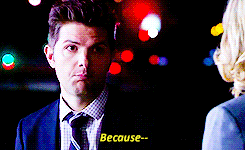
He’s scared of losing Ciel. It becomes apparent with the constant imagery of the Undertaker taking away Ciel and at some point even obtaining r!Ciel’s body, that he’s worried it might happen.
But he can only be worried that Ciel might be taken away if he wants to stay near Ciel.
And that’s his character arc.
Realizing that he actually likes Ciel, cares for him and the role he plays a butler that he doesn’t want this to end.
In the first chapters, he doesn’t feel a need to protect Ciel anymore than what’s strictly necessary. Just don’t die, that’s about as deep as his involvement in chapter 4 gets.
But by the Green Witch Arc, he feels a need to protect Ciel from ANY harm.
This is why I also said
3.- Their relationship is fundamentally a positive one.
In broad strokes, Sebastian to Ciel is the person who allows him to survive. He’s not worried about giving up his soul since he’s already dead. While Ciel to Sebastian, is someone who’s making him have fun. He’s slowly becoming more and more attached to Ciel and the life he has with Ciel.
Their relationship is not that of just a predator and prey, but also of master and pet.
In the terms that Black Butler itself would call: Sebastian is a wild wolf acting like a collared dog.
Ciel is aware that the wild beast will eat him at the end of the day, but if he clings hard to leash for now, he might just be able to have Sebastian maul his abusers.
Sebastian as a dog, currently finds that he enjoys being a chained dog.
(This is demonstrated in the Green Witch arc where he quite literally says, he doesn’t wanna be a wild beast and prefers to be a butler)
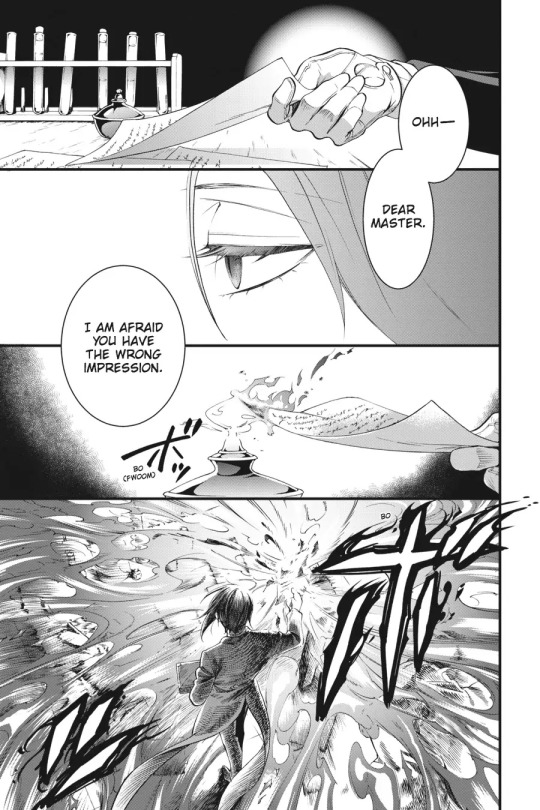
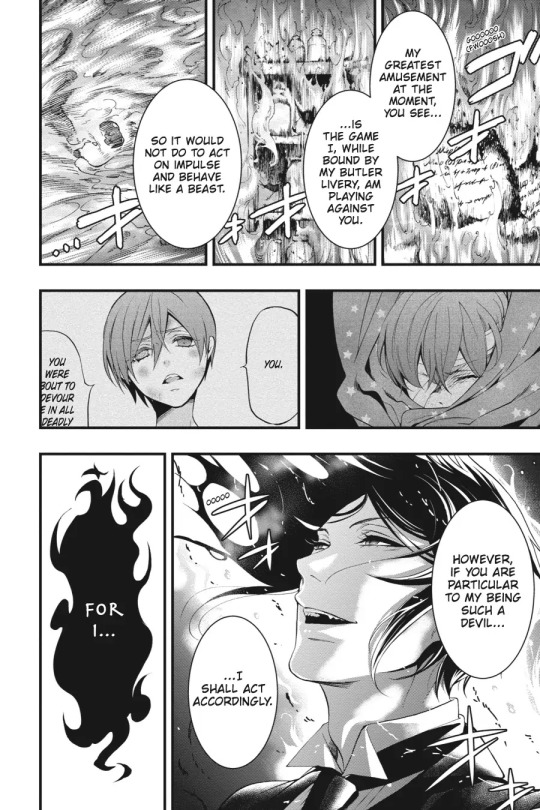
And much like the actual DOG Sebastian, Ciel constantly interprets his attempts to get close and protect him, as an act of aggression.
This push and pull of Ciel’s perception of Sebastian and Sebastian’s true motives is what feeds the story.
And the briefs interludes were that isn’t the case (what other people call the “plot”, but I would refer to as the connective tissue) such as Sullivan and Wolfram, the other servant’s past, the grim reapers and the like, serve as a parallel to Ciel and Sebastian relationship. Either to signify how they care for each other, highlight their weaknesses or fears, or explore how they feel.
It’s no surprise that Sullivan and Wolfram are parallels to Ciel and Sebastian. A sheltered sickly child who seeks the protection of a cold hearted machine that only knew how to kill, but who eventually found he cared for her genuinely.
Undertaker and Claudia’s relationship being heavily paralleled with them, even though we aren’t 109% sure what they had but heavily implied it was a romantic attraction from the undead supernatural creature and a Phantomhive.
Everything is a parallel.
That’s why, like the approach of the terrible original video, is flawed.
Trying to interpret Black Butler as action scene after action scene, with mystery after mystery with the only connective tissue being the mystery of who burned down the mansion - is missing the trees for the forest.
That’s not the point.
And if you’re too much of a prude to engage with gothic horror in its gothic horror game, I see little point as to why you even bother to engage with it at all.
A lot of people, including the person who create the video, simply refuse to acknowledge Black Butler IS the story of Sebastian and Ciel as a close and positive relationship, romantically and sexually charged. The reason for it being that they’re “put off” by it.
Part of me wonders how much that is genuinely true, and how much is just performative outrage. It’s like ignoring the fact that Cersei and Jami are in an incestous relationship and try to frame it as “platonic love”, because the idea of it is THAT off putting.
But regardless of that, if you don’t like the fact that it’s as canon as canon can get, I would reccomend you don’t engage with the story at all.
As I’ve explained, the entirety of the series is about them. If you refuse to see Sebastian and Ciel as, at the very least, a duo that cares deeply for the other - you aren’t reading Black Butler.
I have no idea what you’re reading.Perhaps your own biases and subconscious stigma with British aesthetic. At that point, watch the fucking British Royalty Gossip Magazine. You’d find more substance there.
Just don’t be like the person in the video, please? Don’t play dumb. Don’t ignore the fact that Yana is a Shotacon, don’t ignore the fact Sebastian is a hero, don’t ignore the fact that the entirety of the story is based on Sebastian and Ciel’s dynamic.
Because if you do, you are ashamed. You are ashamed of what this story is about. You don’t wanna engage with the text, you want to engage with yourself. You wanna project into Ciel whatever traumas and experiences you have, for the sake a vanity project, where you come out as the morally superior.
You don’t wanna talk about Black Butler, you wanna talk about how good YOU are. How you “don’t sin” by watching it “without all the gross unholy stuff”.
Which is the exact opposite of what BB is about.
So, if you don’t want to, save us all the humiliation fetish and leave.
515 notes
·
View notes
Text
The Owl House And Restorative Justice
At the end of Season 1 of The Owl House, it is revealed that Lilith, the main overarching antagonist of that season, was the one to curse her sister Eda, one of the protagonists, to win a tournament when they were teenagers. This information causes Eda to fly into a screaming rage and attack Lilith, and understandably so.
Eda’s curse is essentially a chronic illness, one that, in Eda’s own words, has ruined her life, being the reason she’s considered a social outcast and why, before meeting King and Luz, she hadn’t gotten close to anyone in years. In season 2, it’s revealed that the curse is why she pushed away her partner Raine to the point that they broke it off with her, and that during a particularly bad flareup, she accidentally maimed her own father, leaving him half blind and with permanent nerve damage to his hands, making him unable to continue working as a Palisman carver. The curse has ruled Eda’s life for decades now, so to Eda, this is the ultimate betrayal.
In the first episode of Season 2, Lilith has defected from the Emperor’s Coven, split the curse between Eda and herself to mitigate the symptoms for her sister, and has moved in with Eda at the Owl House. While Lilith herself still feels guilty and feels she has to make it up to Eda, everyone else, Eda included, has seemingly either forgiven her or chosen to look past it. Eda even makes fun of her for feeling bad about cursing her, and Lilith’s guilt is seemingly absent for the rest of the series.
The response to this was… Less than stellar, shall we say. A lot of people were angry, saying Lilith got away with her crimes without even a slap on the wrist, and that Eda’s forgiveness of her was far too sudden.
This isn’t the first time we’ve seen this kind of critique. Amity spent years bullying Willow after her parents forced her to break off their friendship, and when she began trying to mend that relationship, the response from fans was that Willow should have been a lot more angry at Amity, and that they went back to being besties far too soon. I’ve even seen this criticism leveled at Hunter for the things he did while working for Belos, at Vee for impersonating Luz for months to trick her mother, and at Luz for hiding the fact that she helped Philip find the Collector from her friends. And it does seem strange for the show to keep tripping on this same point again and again.
Except, it’s not really. Because I think that, when viewing this show from a different angle, those supposed flaws are actually symptoms of something very important to understand – The Owl House operates on a system of crime and punishment that is very different from our world’s.
More specifically, our world mostly utilizes retributive justice. The world of The Owl House utilizes restorative justice.
So first, what do those terms mean? Broadly, they’re two different forms of handling interpersonal disputes, or dealing with crime.
Retributive justice is the one our current justice system uses, where the focus is primarily on punishing the perpetrator. Retributive justice can mean detention, suspension, expulsion, jail time, monetary fines, some kinds of community service, exile, or in more severe cases, corporal punishment or the death penalty. It’s the lens most people view the world through, where if someone hurts you, hurting them back is the correct response.
Restorative justice is a very different approach, where you instead focus on helping the victim recover from what happened, and rehabilitating the perpetrator to prevent this from happening again. Restorative justice can look like verbal or written apologies, monetary compensation for costs and trauma, therapy for both victim and perpetrator, education for the perpetrator, mediation between victim and perpetrator, a restraining order, etc.
When viewed through a retributive lens, The Owl House lets its characters get away with a lot of shit. Lilith cursing Eda, Hunter rounding up Palismen knowing they’ll be killed, Amity tormenting Willow for years, it’s all stuff that, in a retributive environment, they should be punished for, and they’re just not. Eda is only genuinely angry at Lilith for two scenes, Amity and Willow fix their relationship very quickly once Amity starts making amends, and Hunter isn’t punished at all.
However, I believe the story of The Owl House is best viewed not through a retributive lens, but through a restorative lens.
Let’s look at the Lilith-example again. Lilith’s offense was cursing Eda, which she did because she wanted to win a spot in the Emperor’s Coven. Knowing Eda was better than her, she cast a curse on her, thinking it would only last for a day. But when the time came, Eda forfeited the match, soon after which she transformed into the Owl Beast and was pelted with rocks until she ran. The curse turned out to be very permanent, and Lilith spent the next 20 years trying to fix her mistake by working for Belos to try to capture Eda, since he promised to heal her curse.
However, when she finally succeeded, Belos went back on his promise. Instead of healing Eda, he ordered her to be publicly executed. When Lilith protested, Belos essentially told her to shut up, that it was the Titan’s will, and left her there.
So, having realized her method of fixing her mistake has gone real bad, Lilith sneaks down to the Conformatorium to free Eda herself, but arrives too late and finds Luz instead. After a brief fight they end up teaming up, and Lilith leads Luz to the elevator, but they are captured by Belos and Lilith is thrown into the cage with Eda. There, she restores Eda’s partially petrified body, and after fleeing with her, Luz and King, uses a spell to split Eda’s curse evenly between their two bodies.
From a restorative justice point of view, Lilith has done pretty much everything she reasonably could do to fix things. She’s denounced the Emperor’s Coven, returned Owlbert to Luz, helped Luz find the elevator to the execution platform, saved Eda from petrification, apologized to Eda, and while there’s no way for her to cure Eda’s curse entirely, she took on half of the curse at great expense to her own health, in order to ease Eda’s symptoms.
Eda isn’t angry anymore because in her eyes, Lilith has already fixed things with her. Punishing her more at this point is pointless. What more could Lilith do, really? What other lessons could she learn? The only thing that punishment would bring at this point would be more suffering.
Let’s look at another example: Amity and Willow.
Amity’s offense was breaking off her friendship with Willow because she was a late-bloomer, bullying her for years, and allowing her friends to do so too. Willow is left with horrible self-esteem issues because of this, and combined with her failing grades, turned her into a horribly shy and withdrawn wallflower (no pun intended). After she’s moved to the plant track she starts actually getting better, but Amity and Boscha especially continue to torment her. While Amity’s bullying of Willow does peter out over time, Willow is clearly still extremely resentful of her. In an attempt to make Willow forget their friendship, Amity accidentally sets most of Willow’s memories on fire, leaving her confused, amnesiac, and unable to grasp basic concepts like that chairs are for sitting in.
Luz pushed Amity into fixing Willow’s brain by going into her mind together and piecing her memories back together. There, the Inner Willow revealed what happened to Luz and the audience.
At this point, Amity shows her that her parents were actually the ones who forced her to end the friendship because they didn’t think Willow was a suitably powerful or influential friend, threatening to make sure Willow would never get accepted into Hexside if Amity didn’t force her to leave. Amity then apologizes to Willow for going along with it, and for the bullying, and vows to make sure her friends never mess with Willow again.
Willow accepts her apology, but also makes it clear that, while it’s a start, she’s not yet ready to accept Amity in her life again. Restorative justice has not been fully attained, because to Willow, Amity hasn’t fixed everything – Boscha and her squad are still bullying her, and still consider Amity one of them. This changes two episodes later, when Amity tells Boscha to grow the fuck up when she starts bullying Willow again, and joins her and Luz’s Grudgby team despite her personal issues to get Boscha to back off. Willow doesn’t make a grand gesture of forgiveness in this episode, but it is after this point where the two become comfortable around eachother again.
Did Willow forgive Amity too quickly for years of trauma? Maybe. If she had chosen to continue keeping Amity at a distance I certainly wouldn’t have blamed her. But in the end, Amity fixed the mess she caused as best she could, and has proven herself to want to be a better person, to want to be Willow’s friend again. She worked hard to prove herself to be a person worth trusting, and Willow decided to give that trust a chance again.
And while they did become friends again, that friendship was clearly still affected by what happened, which led to bumps that the two of them had to work through. Like in Labyrinth Runners, where Amity’s overprotectiveness over Willow makes Willow feel like Amity thinks she’s incompetent, and still only sees her as the helpless person she used to be.
Willow continuing to be mad at Amity and punishing her for what she did wouldn’t be an unreasonable reaction, but it wouldn’t have fixed anything. It would certainly have an impact on Amity, seeing her former best friend rejecting her attempts to make up for what she did, but the hurt on both sides would have continued festering, because deep down, Willow missed Amity too.
In Hunter’s case, there’s the question of whether he can even be held responsible for his actions. The Palisman-kidnapping in specific was explicitly done under duress – if he failed he would face verbal and physical abuse, and be threatened with his nightmare scenario: getting thrown out of the Emperor’s Coven.
And that’s not an empty threat either. Hunter has no magic, and Belos has drilled it into him that witches without magic have no future. Without the Emperor’s Coven, his only future prospects would be starving to death on the streets or wasting away in prison. Either way, Hunter would be alone, without family or friends, without a job or job prospects, without anyone to turn to for help. Any child would be terrified of that. Hunter wasn’t always acting on direct orders – in fact he defied direct orders to stay in his room in Eclipse Lake to go look for Titan’s Blood, and then again in Hollow Mind to arrest the rebels. But he made those choices based on the idea that Belos wouldn’t want him if he was a failure, and that he needed a chance to prove that he could still be useful.
And contrary to popular belief, Hunter does know right from wrong. He has a very strong moral compass, he’s just been forced to ignore it in favor of doing whatever the Emperor wants. To shut up that little voice telling him he’s doing the wrong thing, he uses what’s called a thought-terminating cliche, a statement that feels so fundamentally true that the argument need not continue. In Hunter’s case, that statement is “It’s for the greater good.” Sure, kidnapping his new friends and abducting Palismen to feed to the Emperor and threatening someone who’s been nothing but kind to him to take the portal key from her girlfriend and justifying terrorism makes his stomach feel like he swallowed a cactus and saying it out loud makes him sound like a horrible person – but it’s for the greater good. He’s doing it to serve Belos, and Belos knows what’s best.
So by the time Hunter is out of active danger and able to rest and recover from what happened to him… what would further punishment accomplish? He already knows that he did fucked up shit while working for the EC, and he’s proven time and time again that while he’s not fighting for Belos’s approval, he’s actually a genuinely kind-hearted kid. Punishing him now would likely cause him to react very poorly, because he’s been at the wrong end of that stick so often that he’s developed severe PTSD because of it.
And if you think restorative justice is still in order – Hunter is currently hyperfixated on making sure Belos can never hurt anyone again, and for the long term, he has expressed that he wants to become a Palisman carver when he grows up. While it won’t bring back the Palismen that were killed, it will help the current Palisman population recover and reintroduce Palismen to witches who may have had to give up theirs.
When viewed through this lens, the writing of The Owl House starts to make more sense. As a show, it is extremely forgiving towards its characters – they’re still held accountable for their actions, but as long as they’re willing to grow and learn and fix the damage they caused, they are very quickly forgiven.
However, I do understand why these writing choices can be… controversial, so to say. Because it doesn’t feel very satisfying, does it? When someone hurts you on purpose, your first impulse would be to try to hurt them back, that’s just how people work.
That’s the hardest thing to come to terms with when you become an advocate for prison abolition for example – you’re not just arguing for freeing a guy who got 5 years because a cop found weed in his pockets, you’re arguing for the release, and most importantly, the humanity of some of the most vile, disgusting people this planet has ever produced. Even now, when someone commits a truly awful crime and gets sent to prison for life, my first thought is “Good, I hope they rot in there.” But that’s not justice. That’s just revenge. And revenge is not something we as a society should want to build our justice system on.
It’s not satisfying to see Lilith go from using Luz as a human shield in her fight against Eda to sleeping on the couch in Eda’s house within 2 episodes. It’s not satisfying to see Willow let Amity back into her life when Amity has hurt her so badly before, or to see Hunter become romantically involved with Willow after he literally abducted her the first time they met. But that satisfaction isn’t really the point. Revenge is satisfying in the moment, but an eye for an eye makes the whole world blind, and if someone shows a genuine willingness to change, it’s often better to give them a chance to.
However, my final point is about what happens when this approach fails. Because not everyone is willing to change. Some people, when faced with the consequences of their actions, decide to dig their heels in and refuse to admit fault, or blame the victim(s), or use those same thought-terminating cliches that Hunter used to justify their actions, “I was just following orders” being a big one.
And thus, we come to Belos.
If Belos showed a willingness to change, a genuine one, not an attempt at manipulation, should he be given the chance to? That vengeful part of me is VERY empathetically saying no. But logically, reasonably, he should be given that chance, if only because he’s a human being and no human being deserves to be mistreated. That doesn’t mean his victims are obligated to forgive him or be around him again, in fact I think that, for the sake of Hunter’s mental health, Belos should stay as far away from him as humanly possible. But he should be given the chance to start over, to truly better himself and do something good with the rest of his life.
But Belos isn’t willing to change.
Belos is a product of a bad environment and grew up with a cult-like mentality and hatred for witches that he had to adopt for his own safety. It’s hard to break out of that mentality, but not impossible. Case in point: Caleb. The tragedy of Belos’s character to me is that he had so many chances to change, so many people to help him make that leap, but all of the people who offered him that help ended up dead by his hands because he couldn’t handle the idea that he may have been wrong.
At this point, Belos is stuck. Changing would mean not only giving up on his life’s work, but acknowledging to himself that everything he’s done, mutilating his body, killing his brother, slaughtering thousands and installing himself as God-Emperor of a population he despises more than anything in order to facilitate a genocide, was completely pointless.
He can’t admit that to himself. Especially the thing about Caleb’s death. He’s sunk-cost-fallacied himself so far into a corner that all he can really do when faced with opposing viewpoints is dig his heels in even deeper and lash out in a rage at anyone who challenges him. Even now, when his body is literally falling apart at the seams, he’s still trying to commit witch-genocide, because it’s all he has.
Restorative justice doesn’t work in this case, because the perpetrator needs to be receptive to it. Logically you would assume the show would default to retributive justice, and characters like Willow and Camila do take a very vengeful glee in imagining themselves beating the snot out of Belos. But right now, the primary motivation of the Hexsquad and Hunter in particular when it comes to Belos is to end the threat he poses. As long as Belos is alive and free, he will continue to hurt and kill people, and if he can’t be talked down, he needs to be either contained or killed to prevent him from causing more harm.
The Owl House provides, in my opinion, a very nuanced take on restorative justice. It shows how it works in action, how different situations impact what it looks like, and what happens when it’s simply not an option. It’s not the most satisfying story to tell your audience, because when someone hurts our babies we want them to suffer, no matter how sorry they say they are. But in this case, I think that sacrificing that bit of audience comfort is worth it to tell the story like this.
3K notes
·
View notes
Text
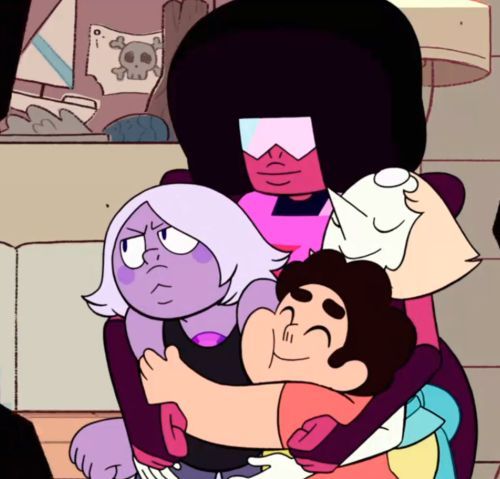
WHAT WAS THIS SHOW ABOUT?
One thing I really love about Steven Universe is that each of the four major characters kind of got a chance to be What The Show Was About. I would have LOVED spending more time with all of them and delving into who they were and who they became beyond what we got, but what we got was . . . actually pretty special.
STEVEN
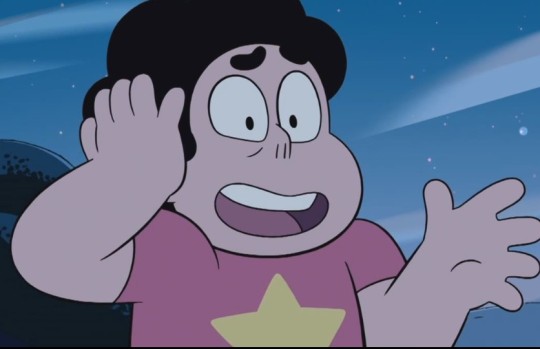
As the ACTUAL main character and the show's literal namesake, it's obvious he's the protagonist. Our man has been through a lot and I don't suppose anyone would say he never got his moment considering he was there for the whole show. But except for some pretty important identity stuff that depended on his choices in the last episode of the OG show, a LOT of Steven Universe is stuff that happened to and around Steven. There was so much history and so much baggage that a lot of the story was about how he fended it off, dealt with it, fought it, reasoned with it, and managed everyone's emotions in the process.
Steven is set apart from the others in extraordinary ways: being half human, being extremely young, being Rose Quartz's son, and having Diamond-level powers and a claim to the Pink Diamond throne.
We had to wait for Steven Universe Future before the show was entirely focused on him, his development, his trauma, and his healing.
Some episodes from the original show focused on Steven's mental health and growth as a person--most notably "Mindful Education"--but we just didn't get to linger very long with his development until the epilogue show because plot stuff was always happening, other people's feelings were taking center stage, and worlds needed saving. I'm really glad we got Steven Universe Future for that reason. Some people disagreed, but I felt like it was a long overdue look into the soul of who he is--how his central defining character trait was his selflessness, and how desperately he needed to address that without having it manifest in a toxic way in the tradition of Jasper, White Diamond, or Pink Diamond.
AMETHYST
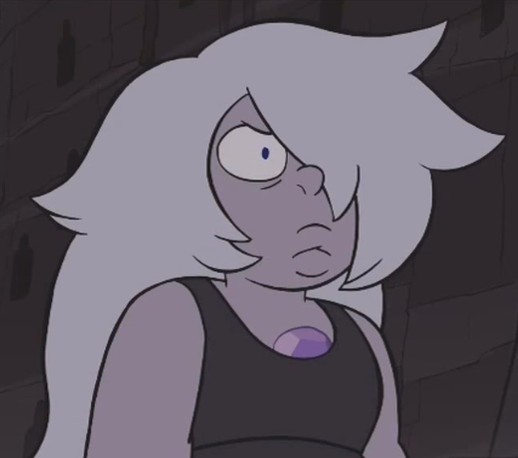
It could be argued that Amethyst had the most careful, nuanced, significant character growth of the three supporting Gems in the show. And it started immediately in the first season, when she constantly squabbled with Pearl and revealed that she felt judged and stifled and treated like a misbehaving child as early as "Tiger Millionaire."
Amethyst is set apart from the others in extraordinary ways: She's the clear outsider as the one who didn't fight in the war, the only full Gem from Earth in the group, the only Gem who grew up with no Homeworld dogma but also no roots, the only Gem who'd never met another one of her own and longed on some level for that connection.
The show continues to check in with Amethyst's self-worth issues throughout, giving us "An Indirect Kiss," "On the Run," "Maximum Capacity," "Reformed," and even "Cry For Help" (which seemed like an Amethyst episode until Pearl did her thing). We get "Onion Friend" when Amethyst shows us she thinks she's boring and that nobody values her. And we get "Too Far" when Amethyst really starts to internalize her inferiority based on Peridot's assessment of her and revelations of her origin.
With her cooking on that, we end up spending a string of episodes with Amethyst as the focus character. She's still shaking off dust about not doing what she's supposedly made for when a fight with Jasper twists the knife. She's beaten and insulted and almost physically destroyed, having to be rescued by Stevonnie. Steven misguidedly tries to cheer her up by letting her win at video games and she reveals that she thinks she's "the worst Crystal Gem." She finds an ally in him but still wrestles with her inferiority to Jasper. And when she still can't beat her in a rematch, she breaks down and realizes her strength is in togetherness. From there, she begins the process of healing, helped along by additional support from her family and finding some connection with meeting the Famethyst. When "Tiger Philanthropist" comes along and reveals that Amethyst doesn't need the outlet of wrestling anymore because she DOES feel she's good enough, we can reflect on what she's been through and how far she's come, and how that leads to her being the one who doesn't fall apart on Steven in the face of huge revelations about his mother.
GARNET
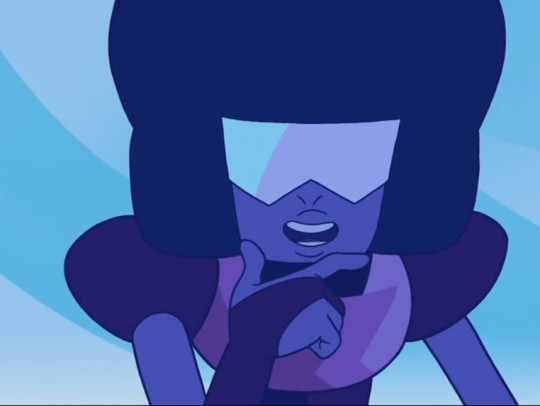
Garnet kind of peaked early, which is not to say it wasn't great. The final episode of Season 1 revealed her identity as a Fusion and further that she was "made of love," and then everyone was on the "Garnet is awesome" train.
Garnet is set apart from the others in extraordinary ways: being a Fusion all the time, leading the team and generally holding the others at an emotional distance, never asking questions, offering resources to the others for stability and balance, being the only Gem with Future Vision and a massive responsibility to use it well.
"Jailbreak" was a huge defining moment for Garnet, and as the "stable" character whose worst problems were mostly other people's problems, she did not seem to need a character arc. She was the culmination of a love story, always awesome and strong and dependable and everyone leaned on her, and in "Jailbreak" we found out why she has such an amazing foundation. But the show was not done with Garnet. Not by a long shot.
Pearl hurt her badly in "Cry For Help." Garnet's breakdown and subsequent focus on building Pearl back up was a significant look into how Ruby and Sapphire operate as a couple. Garnet is amazing partly because she is the result of all that work, but who is she as a person? As an individual who isn't an individual?
We see some of her struggle with leadership as the show moves on--most notably "Pool Hopping," and some of the last episodes when she can't make decisions in the Diamonds' shadow because everything's become about Steven's choices. But Garnet gets a spotlight again when Ruby and Sapphire feel differently about the Pink Diamond revelations and they worry Garnet only exists because of a lie. Digging into the real answers of who they are together through finally asking "The Question," and defining their fusion in their own image, was a move toward more authentic stability for Garnet. Her wedding made headlines, and watching her spearhead the immediate fight against the Diamonds on the beach was awe-inspiring.
PEARL
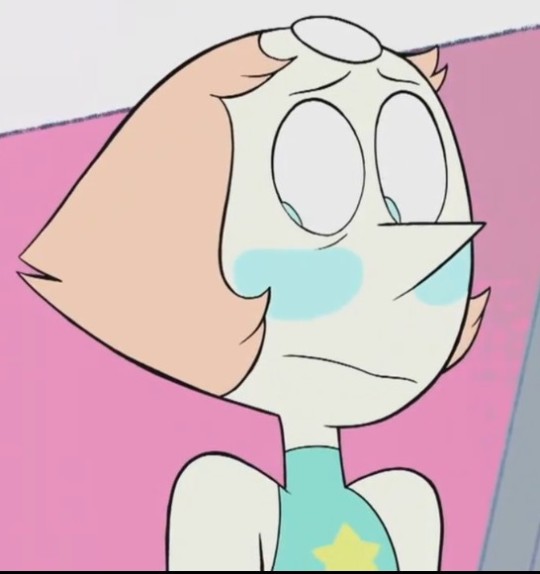
Pearl is initially presented as "the perfect one"--she's persnickety, she's organized, she's hyper-competent, and she's all about rules. But something else is going on with her not far beneath the surface. The first Gem to die onscreen--because of overconfidence and a silly mistake. The first (full) Gem to cry onscreen (and then over and over and over), the first to have a breakdown (and then over and over and over), the only one of the four to have faced an impossible choice, a relationship that nearly destroyed her, and a secret that ate her up from the inside. She was the only one who had (nearly) the whole story. All along.
Pearl is set apart from the others in extraordinary ways: the oldest Gem of the group by far, the one who served a Diamond and kept Rose Quartz's secret against her own will, the one who doesn't eat, sleep, or shapeshift. The one who both sat at royalty's right hand and existed as the lowest form of Gem life--created to be a servant, with programming no other type of Gem must live with. Her anxiety, grief, and desperate loneliness makes her one of the most multifaceted and interesting characters in animation history.
We see some minor wigging out from Pearl in "An Indirect Kiss" and a more intense version of it in "Space Race," but we get a much clearer picture that Pearl is Not Okay in "Rose's Scabbard." At that point we assume she thought she was closer to Rose than she really was--that she thought herself special and partial to secrets no one else knew, but that it wasn't true. "Rose's Scabbard" is a different episode on rewatch. Pearl is right that she alone was the one Rose "told everything." She did have a special relationship with her that the others did not.
Pearl's insecurity continues to bite us in the face as the show goes on. She tries to mold Connie into a self-sacrificial super-soldier after her own image in "Sworn to the Sword." Her deep need for someone strong to tell her what to do leads her to betray Garnet in "Cry For Help." Her inability to appropriately make it up to Garnet further complicates our understanding of how she can be so lost. Her jealousy, inertia, and angst frustrate her relationships, with some nice resolution in "Mr. Greg." Peridot's lore drop about Pearls' slave status sheds light on this, and seeing her get underestimated and bossed around by other Homeworld Gems is disheartening as we move on, but when we finally find out that she was Rose's secret accomplice in a false murder that poisoned thousands of their own citizens and led to massive waves of death, and that Pearl's free will to speak about it was also ripped away from her, we finally know, we know why she's been so brittle she could snap all along. She's been trapped inside herself all this time--in an almost literal way--and it's a wonder she's managed to carry on. Pearl's arcs have often been deemed the most emotionally fraught and tinged with gray morality.
These characters all got some very important story arcs focused on them in the midst of moving the plot along. I think the show did a phenomenal job with not only emotional development but with fallout for the other characters. We got to see the Gems' (and other loved ones') reactions when Steven's mental health took a nosedive, and watched them learn more about how to be there for him. We got to see Steven's initially misguided attempts to hype Amethyst up when she was spiraling, leading to him offering her what she actually did need, along with Garnet and Pearl (as Sardonyx) misfiring a bit when they wanted to celebrate Smoky Quartz. We got to see Steven's curiosities and misgivings about Garnet's life as a Fusion, and how Garnet affects others when she does crack under the strain, and how Steven must step up to leadership when Ruby and Sapphire are separated and how Amethyst tries to take care of him while Pearl has a guilt spiral. And we see how Pearl's choices led to Garnet's silent treatment, Amethyst's sulky helplessness, and Steven's attempt to hold the family together; we see how Pearl's confession reformats everyone's understanding of who the Crystal Gems are and why they're even here.
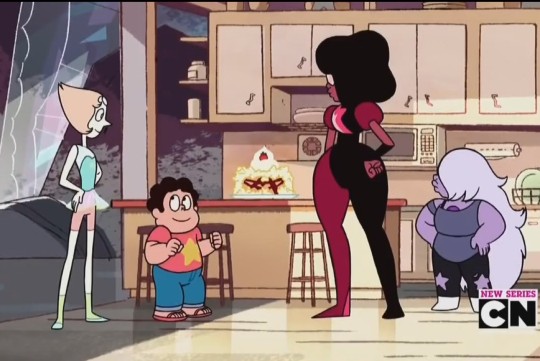
And even when the show is taking careful turns with each character to paint their nuanced feelings and troubles on the screen, it still managed to give us such a worthwhile overall story, with action and backstory and worldbuilding and everything. What's different about it is that the center was always its people--their relationships, their psyches, their evolution and education. I truly love the balance these creators chose, and I remain grateful that we got to experience this story.
251 notes
·
View notes
Note
What advice would you give to an aspiring henchperson?
now to be fair this is a bit of an armchair analysis thing since I'm currently between villains. (optimistic about my next interview though. I can't disclose too much but I might finally get to work with tractor beams.)
the main things I'd suggest are:
figure out what you're best at, and zero in on it! are you a schemer constantly out to usurp your employer, but too useful to kill? focus on muttering darkly and keeping a list of good betrayal opportunities. more of a bruiser with a hidden intellectual streak? hit the gym, but make time for reading and theatre as well! the important thing is that you have a clear view of yourself, your goals, and how they relate to your employer's needs. if you're a mad scientist working for an evil businessman, you're only wasting your time if you learn to wield ordinary small arms instead of lasers that transmute stone into gold or cannons that shoot mutagenic goo.
be a team player! if you were a lone wolf, you wouldn't be getting into henching - you'd be going independent. remember, your employer's other 2-4 major henchfolk are there to provide comedic/dramatic contrast and to let you do that thing where each of you fights a different one of the protagonists at the same time, and at first you're winning, but then they switch who's fighting whom and turn the tables. as for the nameless and disposable minions, they're your minions too! any decent supervillain will be eager to give you a squad or two to command and re-theme to better match your whole deal.
you gotta be gay! self-explanatory.
443 notes
·
View notes
Text
"Golden Deer is boring though it's lackluster, the characters aren't as strong as the other paths there's less conflict-"
You fool. You absolute buffon. Golden Deer is perfectly designed. Not only does it feed into the whole "alliance" theme well by having the characters still work together despite their differences and feelings well before hitting those A supports, but it's ALSO the only route that actually puts the focus on YOU the player. Or, rather, Byleth themself
Black Eagle is about whether or not you can agree to Edelgard's ideals of acceptable sacrifice and perspective that there's only 1 way to do things. The branching happens when you decide whether or not you agree, but ultimately it just explores opposing or agreeing with Edelgard. Anything more than that is really just incidental to that main concept, whether it's Crimson Flower or Silver Snow, the entire time you're focused either on helping Edelgard achieve her goals or you're focused on showing her how wrong she is alongside the Black Eagles who think it's their duty to correct Edelgard's wrongs (and I have a whole separate thing in regards to how the cast acts in Crimson Flower verses Silver Snow). It works really well for characters designed around an empire, a domineering form of government where (usually) a singular ruler determines the course and focus
Blue Lions is focused entirely on working on past issues and learning to bring yourself into the present, but it's done almost entirely through the cast more than the player. The Blue Lions themselves all have their own traumas and deep-seated past issues that hinder or help progress. While both Blue Lions and Black Eagles have a lot in common when it comes to traumatized characters and ideology, the ideology is front and center, while in Boue Lions, their interpersonal conflicts are front and center. This shows especially in the final (non romance) scene, where Dimitri decides that his personal attachment to Edelgard and past memories still matter, and he reaches out a hand, despite her immediately trying to kill him. It's fitting for a route designed around a kingdom, which is usually built entirely on interpersonal dealings between the ruling class
Golden Deer, however, is designed very differently. Unlike the other 3 routes, the player, or more specifically Byleth, is put as the driving force instead of the Lord. And this is actually what makes Golden Deer such a good route and one with the best ending of all of them. Claude has ideals, but he isn't a person who wants to force others to follow his path like Edelgard. Claude has lived a life of strife where his past motivates him, but it doesn't chain him the same way it does Dimitri. Instead, he works on understanding everyone around him and working together towards agreed upon goals, while taking on stuff that isn't agreed upon onto himself. But more than that, while all the Lord's value your opinion, Claude is the only one who actually takes what Byleth wants (rather than just what they think about specific matters) into consideration for his plans. Repeatedly you tell Seteth in Silver Snow that you don't want to kill Edelgard, but he pushes that you have no choice. Pretty much the entire first half of Azure Moon is Dimitri ignoring you. And in Crimson Flower, you've all but completely submitted to Edelgard's will with a couple of exceptions (which actually proves my point because it's specifically in regards to the Golden Deer because you can fight the entirety of Crimson Flower while sparing all of them except for Judith). But in Verdant Wind, Claude doesn't hide that he has a problem with the church and wants Rhea gone. In Golden Wildfire, without Byleth, he's more than happy to just get rid of her without a second thought. But when Byleth is the protagonist, he goes out of his way to accommodate your wants into his plans and goals. When you express as the player that you want to reason with Edelgard and ponder if you can't walk the same path, Claude agrees with you and says he'll make it happen if he can, with the other Golden Deer mostly agreeing. When that,can't happen you both lament the fact that Edelgard gave you no choice together. He makes finding Rhea a priority, mostly because as curious as he is in general, he wants to help you find out answers only Rhea can give you. And all of the Golden Deer do this to some extent, with each other but also with you as the player. I think Hilda and Marianne's A supports with Byleth show this best personally, but that's a personal opinion. And it just works so well for a route designed around the idea of an alliance, people coming together and agreeing to work towards a goal bigger than themselves
And that's not to say the other routes aren't as good as Golden Deer, they're all equally well written, but it just makes me sad when I see people giving the Golden Deer route grief just because the characters aren't the same when it does its theme so beautifully
#fire emblem three houses#fe3h#claude von riegan#claude fe3h#golden deer#byleth eisner#byleth fe3h#dimitri alexandre blaiddyd#edelgard von hresvelg#blue lions#black eagles#crimson flower#silver snow#azure moon#verdant wind#edelgard fe3h#dimitri fe3h
435 notes
·
View notes
Text
Lore Rekindled; The Lore Olympus that should have been
To be honest, I checked out the rekindled version before the original one and now having reading the original as well, it's extremely odd. Y'know goodbye volcanic high where the original was a mess but a group of 4chaners made a parody game which turned out to be of better quality than the original? This is like that but replace 4chan with tumblr users, mainly @genericpuff whose series is pinned in their tumblr blog where you can check all of the episodes, especially updated ones. In this post, I will be praising this series of how it fixes the problems of the original
The Pacing
One thing I notice about lore olympus and lore rekindled is the pacing. Not just the flow of the story but where it chooses to focus on. Now in lore olympus, the pacing is kinda a mess and its mainly to do with what it focuses on. An example is the magazine plotpoint; in the original, its basically kinda there in between doses to focus on other stuff like persephone and hades together, persephone's sa (i'll get to that later), eros story, zeus and hera etc...The flow generally isnt that bad per say (except for persephone's sa cuz that was way too quick) but for a story meant to be a romance between hades and persephone, you'd think it idk, it would focus on persephone and hades specifically, not eros which is another example of; its flashbacks. Eros specifically has such a dragged out flashback in episode 12 which we didnt need or at least with that much exposition when it should've naturally expand in the story and that's what rekindled does. The magazine plotline has turned into the first conflict of persephone and hades as we see how it affects their lives and relationships. This works for its pacing better because it doesn't give you too much stuff to jumble with, making the narrative more concise and easier to understand where the story is going. And with the flashbacks, rekindled cuts out the fat in the flashbacks from the original to a perfect balance where it gives exposition of the characters while also leaving mystery for the audience to be intrigued, my favourite one would have to be this (though it more of a nightmare than a flashback specifically speaking);
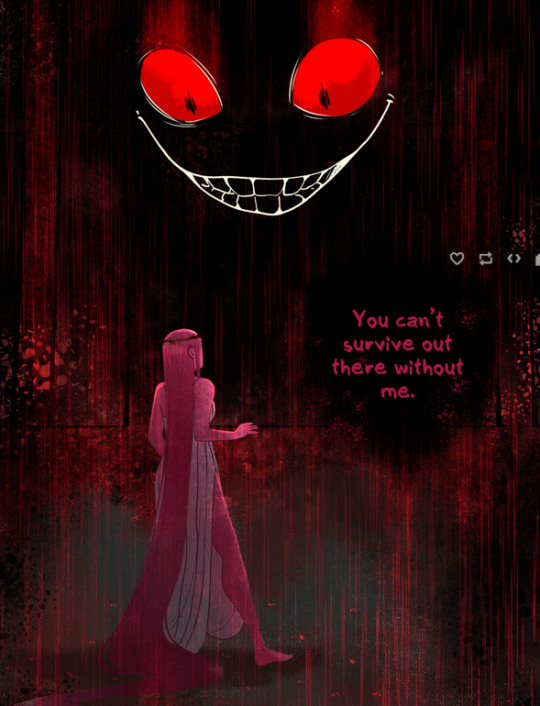
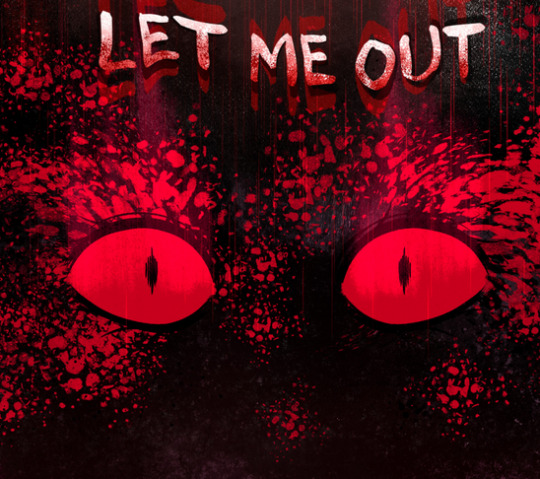
It's of persephone in a greenhouse her mother placed her in with this red eye thing following her from outside the greenhouse. I have no idea of this lurker if its her metaphorical rage or a danger in her life but either way, i am intrigued by its presentation.
The Characters
When reading lore rekindled and lore olympus, the characters are definetly an odd experience. For lore olympus, the characters arent exactly uh....great per say. I think the main reason for this is how their ultilised, with characters like eros, hera, hectate etc being there to mostly be a matchmaker for hades and persephone even if it was initially seen as wrong like with hera and hectate, be antagonistic as a way to have conflict between hades and persephone like minthe, demeter and recently leuce even if ones had reasons too like minthe with hades emotionally cheating on her and demeter because lets be honest, she had a point. Then there's hades and persephone, whoo boy where to start with them.
Hades starts off as a creep eyeing at persephone during a party, specifically at her body and still lusts persephone even being aware that shes 19 and he's 2000 years old. Also is a shitty boss, father AND contributes to slavery with it while being adressed in some way, doesnt change him which isnt good for a character that's meant to be the main protagonists love interest.
Persephone though, I can get the self insert vibes. From favouritism towards the story, being who most of the men in the story are attracted too, portrayed as a 'cinnamon roll' (they actually said that early on in the story, im not kidding) who cant do no wrong. She acts like a teenager rather than a young adult which makes the scenes where shes sexualised just more uncomfortable (and they already unnecessarily were) along with adding that uncomfortability to the romance
But with rekindled, they expanded on the characters much more than they originally were. Persephone for instance has turned from a 'sexy baby' legal teenager to an actual young relatable adult with agency and allows her to screw up (e.g, getting drunk on her own rather than eros drunking her). Her adult attitude makes the romance between her and hades not only more palpable, but also strays away from the infantilisation/uncomfortable sexualisation of her character which is nice to see. Hades also is written well in the series from how it acknowledges his faults while still making him likable. And thats the same for every character really, their personalities are much more fleshed out and nuanced which makes their characters feel real to life, gaining effectiveness for more emotional scenes with them. An interesting thing too is that they even expanded the magazine guy's character from making fake news for profit into feeling guilt over what they done, standing up for persephone which is a pretty nice change.
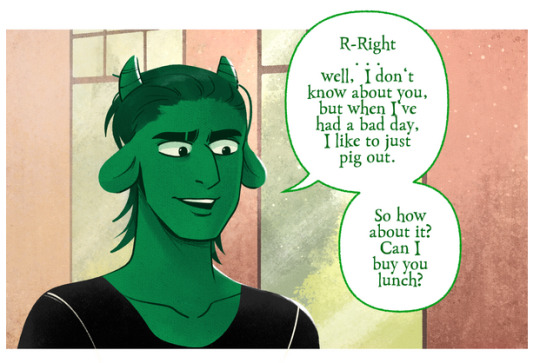
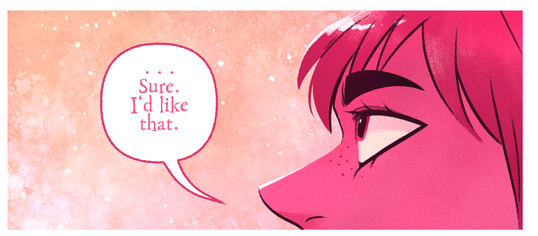
No Sa Plotline
Not like you cant have sa in your story ever but if you never planned it from the beginning and only did when people tell you that the scene you drew from your comic was sa then....maybe just not do it. Lore olympus does exactly that where while an attempt was made, it goes on to retcon it into making apollo (the guy who sa'd persephone) into a lesser evil like that would made a difference instead of just cutting it out from the very beginning. Lore rekindled thankfully just made apollo into his pilot version, a shitty bf but more likeable and expanded upon (which should have been his portrayal from day 1). His shittiness doesnt come up in the story, more like self absorbness/egotisticalness although with its recent chapter of the magazine guy offering persephone lunch, it might reveal some cracks or at least further down the story it will be revealed to us which futhers how effective rekindled character writing is in how its expansion of characters would give us the feels. That or portray him as not a good match for persephone, either way much better than the original.
Artstyle
Lore olympus has a pretty good artstyle (at least in s1/the early episodes, s3 is just kinda goofy) but lore rekindled has got a good artstyle which is on top, more consistent too. Here's some examples;
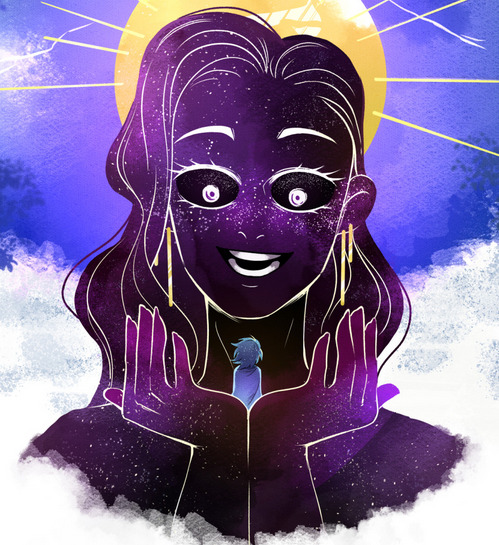
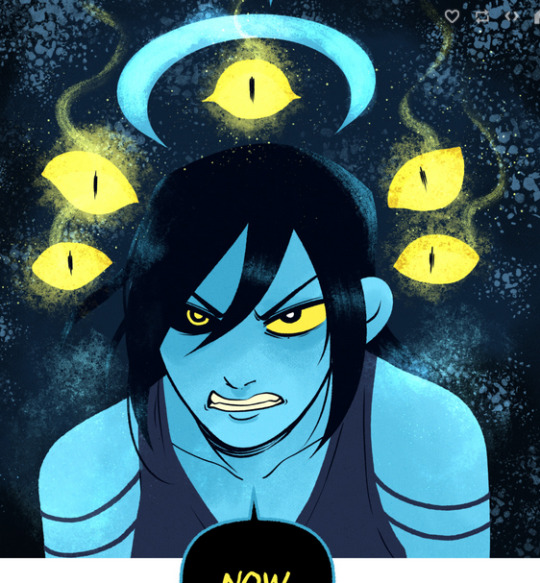

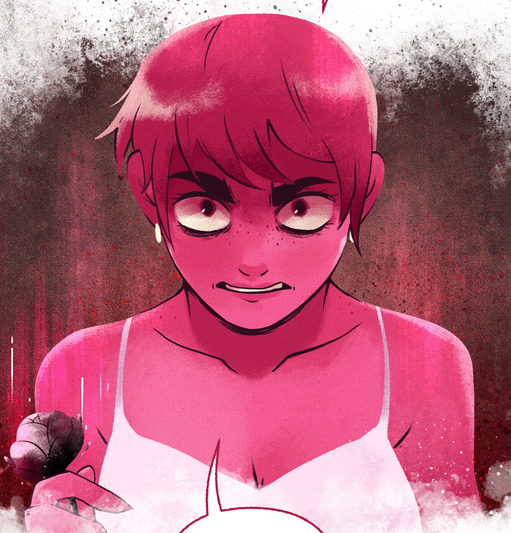
Comedy

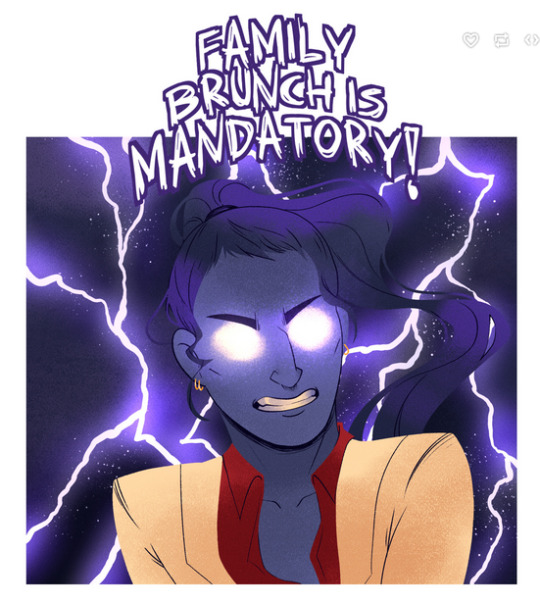


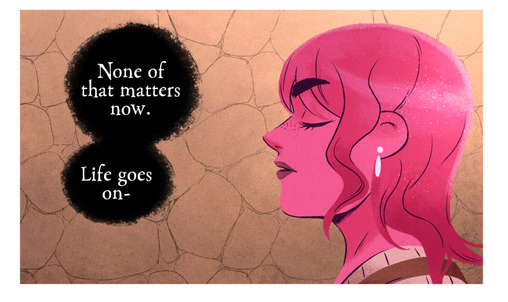

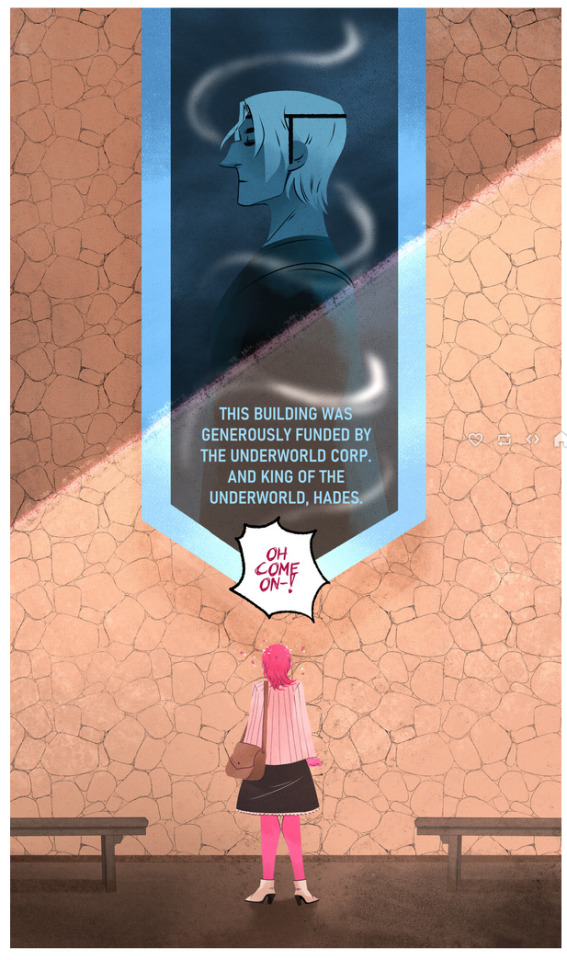
It's objectively funnier than lore olympus, no question asked
All in all, if you want to read lore olympus, i recommend you to read the lore rekindled one instead as it's better in every way. Give it a read.
#lore olympus critical#lo critical#anti lo#anti lore olympus#lore rekindled#generic puff#genericpuff
671 notes
·
View notes
Note
Hey! Asking for some writing advice here.
How does one write a villain exactly. In a very simple world with no superpowers and stuff how do you give them motivation. How do you make them slowly descent into villainy. Somehow when the villain actually thinks they're doing the right thing until the very end?
Thx love
There are a few different questions here that I'm going to try to to unpick.
I'll start with a brief overview of the connections between protagonist + antagonist, just because recognising them can be really useful in shaping your own ideas. Then I'll dive into motivation. So.
Antagonist + Protagonist = CONFLICT
If you know your protagonist well, then you have all the ingredients you need to write a great villain/antagonist for them too. Here is why.
Your villain/antagonist is, at the most basic fundamental starting point, something that is between your protagonist and what the protagonist wants/needs. As a very simple example, if your protagonist wants to make sure that everyone is free, then your antagonist is going to in some way be involved with making sure they are not free. Once you know what your antagonist needs to do in a story, then it's a lot easier to pose the question to yourself of 'okay, why would someone do that?'
Villains often reflect an opposite or warped view of the values and motivations that your protagonist has. They mirror or foil your main character. So, your antagonist's motivation will often be either opposite to the protagonist (e.g, your protagonist is motivated by selflessness, so your antagonist is motivated by selfishness in some way) or they will be the same motivation or value gone twisted (e.g. we both have people we love who we would do anything to protect...it's the villains way of acting on that motivation that makes them the villain, not the motivation.)
Of course, you can not have your antagonist + protagonist connected in this way. This is often the case if the source of conflict in your story is not another actual character or if you have a more generic villain. Lots of great stories have generic villains. It typically just means the villain is not a focus. It might be, like, about the friendships made in the journey instead.
Motivations:
I find it helpful to think of all my characters having two motivations.
The external story-specific motivation. This is whatever the antagonist is trying to achieve in your particular story and where things like genre and superpowers etc come into play.
The internal motivation that is more universal. The internal motivation is, while still specific to the character, the driving emotions and values. With a villain, that is often hatred or fear or lust for power because they're villains, but as noted earlier it can be a twisted form of love, or a strong sense of an injustice committed against them. This shapes the external motivation (e.g. 'lust for power = I want the throne, 'fear' = I'm going to kill or belittle or control what scares me so I don't have to feel scared anymore', justice might equal revenge or gaining power to ensure that a wrong is corrected. ) It could also be a bias or a prejudice that they're raised on driving them, that they genuinely believe in. Lots of possibilities!
I think this is true of people as well. We have our foundational core beliefs and desires (to be loved, to succeed, to be accepted whatever) and then we have the things we try to get in the real world to meet those needs (whether they really will or not).
Either way, it's the second one that comes into play with the slow descent into villainy and the villain thinking that they're doing the right thing until the end. Because, initially, their heart genuinely is not in a villainous place. They may actually be doing the right thing at the start. And then bad things happen. They are changed by the journey. They are a protagonist gone tragic.
We all experience emotions that can drive us to behave poorly; the desire for revenge or recognition, to ensure that the people we care about are safe, to get money so that we can provide for ourselves and others etc. None of us are without prejudice or privilege. Those things do not make you a villain, but they can be an excellent starting place for one.
Think about times when you've messed up. A villain is often an exaggerated version of that. You start pushing your own boundaries because there is something you really want/need and, depending on how far you push that...do you feel like you can still go back? Or do you feel like you might as well finish it after everything. At what point do you breathe for air, look up at what you've done, and go shit.
That's the villain who realises way too late that they're the villain.
Final note: I've been using antagonist and villain pretty interchangeably here...but they have slightly different connotations. Your antagonist does not have to be a villain to be effective. They just have to be an obstacle to the protagonist. E.g. if two people are going for the same dream job or trying to win a competition, the other competitors are antagonists to a certain extent, but that doesn't mean they're villainous or bad people. Whether you have an outright villain will depend on your story.
I hope this helps!
Some going further questions to take with you.
Is your villain trying to stop your protagonist from reaching their goal? Or is your protagonist trying to stop the antagonist from reaching their goal?
How does the villain's external goal in the story reflect the inner need? Note. They are aware of their external goal. Most people are not aware of the inner goal in the same way.
Do you know what you want your stories themes to be? (This doesn't have to be complicated and it's fine if you don't, that's what editing is for). Your protagonist and antagonist often weigh in on these themes. For example, your antagonist might be a path the protagonist could have gone down, if they made a different choice or something happened differently in their past.
#villains#antagonist#writing advice#writing tips#writing talk#writing villains#writing tip#writing help#character creation#character building
356 notes
·
View notes
Text
I.M.P is irrelevant to Helluva Boss

When Helluva Boss Pilot came out,I was really excited, to know more about these characters, their personalities, their relationships to each other and how they would develop. Additionally, I was also wondering on why each of these characters joined I.M.P and why did Blitz start his own business.
However, as the series went on, the show went on to become the Stolitz show along with dedicating episodes to fan-favourite characters that have nothing to do with I.M.P (Ozzie, Fizz and Stolas).
This is one of the (many) reasons why I'm disappointed with the current state of Helluva Boss, I.M.P's irrelevance to the main story, while I do enjoy the new episodes. There are a lot of story issues that I have with it, the fact that IMP is basically irrelevant to the Helluva Boss.
NO IMPACT ON THE OVER ARCHING STORY:
So far we only had five out of fifteen episodes (excluding the times where it's offscreen), of IMP doing it's job is the main plot of the episode, while five episode may seem fine for some it becomes a problem when their actions are basically inconsequential to the main story.
The only times where they are important is for one-off adventures like in Murder Family, Spring Broken, CHERUBS & Unhappy Campers. The problem is that their existence doesn't impact Stolas' story in anyway (aside from Blitz), like why are we focusing so much screentime on Stolas (a secondary character) who isn't even employed at IMP. And instead focus on Blitz, the titular character, protagonist and him being the boss of IMP. Understanding his goals and reasoning as to why he wanted to start IMP.
HELLUVA BOSS? WHAT BOSS:
Another problem I have with IMP, is the fact that we don't know why Blitz wanted to start a business on killing people, was it because of his tragic past and to distance himself from it, is it that he discovered he's really skilled at killing people and decided to make it big , is it because he wants love and new connections from his employees, is it to prove the higher class or his father that he can make it big and break class traditions. What is it? We only now why he wants love and respect from his employees due to his tragic past. But we don't know why he started his business.
Also we never get to see him develop into a caring boss that genuinely cares about his employees, with the show only showing the ending of the development in the same episode but none of the development.
In addition, we also never get the chance to see him as a leader of IMP, you think Blitz would be the leader and he needs to grow into being one for his employees. But the show never has Blitz develop into becoming a Helluva Boss.
NON EXISTENT SURFACE-LEVEL RELATIONSHIPS:
Another thing I really hate is that the relationships between employees at IMP, are never explored beyond the surface level. The only one I can say this doesn't apply to is Moxxie and Blitz.
We don't get to see the M&Ms relationship grow outside of loving each other, and when they do explore it, it's written poorly (Unhappy Campers).
We don't get to see Millie and Luna, relationship grow, they don't even talk to each other that much in the show. What is Blitz & Millie relationship, why do they get along with each other, why is she fine with Blitz behaviour. Luna and Moxxie relationship, why is Luna so mean to him, how does Moxxie feel about Luna bullying him, has she ever went too far, would Millie get angry at Luna for bullying.
(Side tangent; but why is Millie not standing up for her husband when Blitz and Luna bully Moxxie, they do it right in front of her. Wouldn't she get angry at them, edit: I checked and she did get angry at Luna for calling Moxxie fat, but not at Blitz for joking about this. But she needs to say something, put her foot down, not just make an angry expression)
EMPLOYEES LACK OF REASONING:
We don't know what the employees motivation was to join IMP. Why did Moxxie and Millie join IMP, was it to prove their parents wrong, to make it big, or is it for similar reasonings to Blitzo.
Why did Luna join IMP? Was it out of gratitude for Blitz saving her, was it because she couldn't get a job as a hell hound, was it to be with her father more.
-----
Anyway, that's my thought for a day, on Helluva Boss, let me know what you think about IMP. Do you agree? Disagree? Why? Let me know!
#helluva boss criticism#helluva boss critical#helluva boss critique#vivziepop criticism#vivziepop critical#hazbin hotel critique#hazbin hotel critical#helluva boss#helluva critical#meme#memes
385 notes
·
View notes